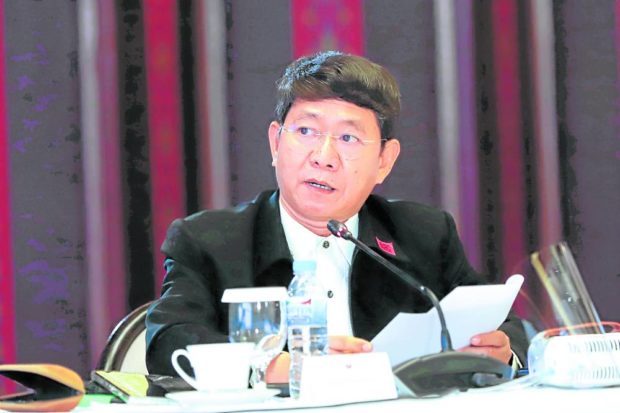DILG eyes police teams vs vote-buying

Interior Secretary Eduardo Año (MALACAÑANG PHOTO)
MANILA, Philippines — The Department of the Interior and Local Government (DILG) has directed the Philippine National Police to create “antivote-buying teams” in each province and city in the country to receive complaints and investigate allegations of vote-buying and vote-selling.
“This is a concrete effort of the DILG and PNP to support the Commission on Elections (Comelec) and the Inter-agency Task Force Kontra Bigay in ensuring a fraud-free election,” Interior Secretary Eduardo Año said in a statement.
According to Año, the police antivote buying teams are tasked to receive and process complaints of vote-buying or vote-selling, investigate, gather and preserve evidence, take statements of witnesses, and protect witnesses or complainants by coordinating with the proper government agencies.
Anonymous complaints will be acted and verified by the PNP antivote-buying teams for proper action.
People filing a complaint or reporting an incident of vote-buying or selling who desire to remain anonymous will also undergo the same verification and evidence-gathering.
Article continues after this advertisementEven anonymous complaints
“Evidence-based complaints” verified by the police teams will be forwarded to the Comelec, which is the proper agency to file cases of election law violations.
Article continues after this advertisementUnder DILG Memorandum Circular No. 2022-058 dated May 6, Año directed all police regional and provincial offices, and city and municipal stations to constitute dedicated antivote buying teams.
The PNP regional offices will collate and monitor the status and progress of the complaints filed, including anonymous complaints and reports.
“The public should know that these PNP antivote-buying teams exist, and they should also be informed where they could report information of election offenses in their communities,” Año said.
10 cases under investigation
The establishment of the PNP antivote-buying teams is in compliance with Comelec Resolution No. 10755, mandating a more effective implementation of election laws and or rules and regulations, particularly the laws governing prohibition against vote-buying and vote-selling.
Under Section 264 of the Omnibus Election Code, those who would be found guilty of vote- buying and selling will face an imprisonment of one to six years. They will also be disqualified to hold public office and their rights of suffrage revoked.
Violating foreigners will be deported to their home country after they serve their prison term in local jails.
The Comelec is currently investigating at least 10 cases of vote-buying, according to Commissioner Aimee Ferolino, who heads the Task Force Kontra Bigay.
With the cooperation of the Integrated Bar of the Philippines and election watchdog Legal Network For Truthful Elections (Lente), the task force reported one possible case of vote-buying as the complainant executed an affidavit and submitted evidence.
The task force is also encouraging the public “not only to report incidents of vote-buying or vote-selling, but to come out and to actively participate in the investigation through the execution of an affidavit and submission of evidence.”
Vote-buying and vote-selling incidents can also be reported to Task Force Kontra Bigay’s official Facebook page and its email address at [email protected].
RELATED STORIES
Vote-buying reports reach Comelec; more VCMs rejected
Vote-buying spree out in the open in Pangasinan, Bohol, Eastern Visayas